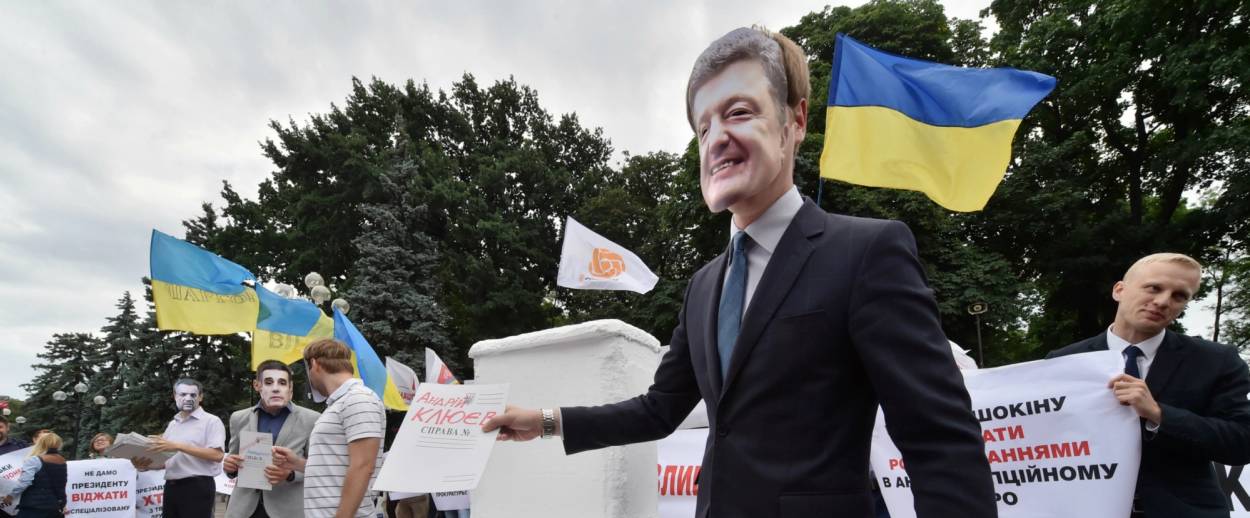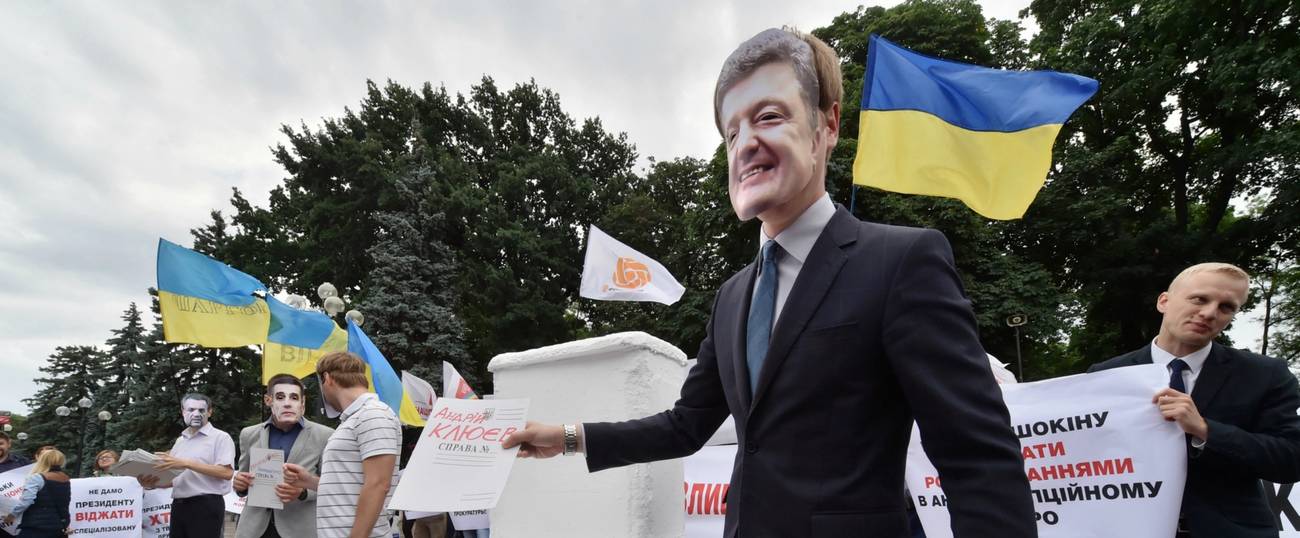In Lviv, a Dubious Anti-Semitic Demonstration
Ukrainian Jewish leader: ‘In this region there does not exist even the slightest manifestation of xenophobia or ethnic intolerance’




Late last week, an anti-Semitic demonstration, widely considered to be a bogus provocation, was held outside of the regional administration building in the western Ukrainian capital of Lviv where an estimated 100-150 protesters clutched oblong and professionally printed banners. Two of these featured anti-Semitic slogans. The signs were aimed at the administration of Ukrainian President Petro Poroshenko and his allies. On one of the posters were inscribed the assumed “authentic” Jewish names of a dozen of Ukraine’s political leaders. Other banners accused the “Jewish fraternity of selling off Ukraine’’ and another cautioned against the advisability of “Jews in power.” But the only prominent member of the Poroshenko government who is Jewish is parliament speaker Volodymyr Groysman.
The demonstration was organized by a civic organization called “Active Element,” which had been newly registered in January 2014 by a man called Oleh Onats. The news portal Zaxid.net interviewed Onats, who admitted to being a “co-organizer” of the event, but declined to provide the names of his partners. He also denied that money had been paid to protestors for participating even though the news channel had apparently filmed such transactions. During the protest, police were present en force but did not move to make arrests as the demonstrators had previously filed for a legitimate permits even though they were careful to not specify the exact nature of their grievances. (This demonstration did not seem to be in coordination with the ultra-nationalist Right Sector demonstrations taking place in Kiev at about the same time.)
The incident is the latest attempt to weaponize accusations of anti-Semitism in the conflict between Russia and Ukraine. Proving that the government in Kiev and the population in the western Ukrainian heartland is infested with neo-Nazis has since the very beginning of the conflict been the core strategy of the propaganda coming out of Russian media organs. The Kremlin has a keen interest in building up an alleged equivalence between the crimes of the Nazis and what it claims to be similar ultra-nationalist tendencies amongst Ukrainians who want to be independent of the Russian sphere of influence. This rhetoric directly echoes the Soviet Union’s labeling of any actor that opposed its geopolitical interests as “counter revolutionary.” Successfully doing this would of course delegitimize Ukraine by mobilizing World War II tropes of historical memory and associating it fatally with fascism. Coming to the aid of Ukraine’s ostensibly beleaguered Jews is a major pretext of Russian foreign policy in fighting Anti-Semitism and Fascism.
It is thus understandable that the Ukrainian Jewish leadership quickly responded and disowned this sort of backhanded “assistance” that could very well potentially transmogrify into the authentic version of the very animosity that so far exists only in illusory form. “Having spent a lot of time in Lviv recent years, I can say that in this region there does not exist even the slightest manifestation of anti-Semitism, xenophobia or ethnic intolerance,” Aleksander Suslenskyi, the incensed president of the Ukrainian Jewish Council, explained to me the day after the incident. “The city is open, tolerant and friendly and all sort of people live here regardless of their color, language, religion. So I do not see here any preconditions whatsoever for such rallies and riots.”
Suslenskyi then speculated about the timing and deeper context of the proceedings, linking it to the possibility of the upcoming regional and mayoral elections, and the potential destabilization of mainstream Pro-Ukrainian political parties. “It is possible, this situation is linked to the upcoming regional and mayoral elections. To judge by the abundance of fraternal (i.e an ironic way of saying, “Russian”) cameras that instantly appeared at the scene and created lurid news reports for Russian TV, I think all this is part of the second front of the “hybrid war.” I also think the guy who organized the meeting was a Russian FSB operative or employee. The aims of this meeting were obvious to everyone.”
An investigation into the episode had been opened up by the SBU intelligence service under Section 1 Article 161 of the Criminal Code, which deals with racial incitement. The Jewish community of Lviv has also submitted a formal complaint to President Poroshenko’s office. On Sunday, several members of the Lviv community offered a bounty of 5000 Hryvna over social network sites like Facebook for information on the person(s) who paid for the banners.
In addition to Suslenskyi, many actors within Ukrainian civil society, media, and the elite of Lviv’s own political establishment reacted to the incident with indignation and understandable apprehension, moving swiftly to debunk the claims of Anti-Semitism. Oleh Bereziuk—Suslenskyi’s friend and local political ally as a member of parliament and parliamentary faction leader of Lviv’s powerhouse Samopomich party—concurred. “This was an absolute provocation,” said Bereziuk, “as these same people a week ago also held a similarly paid up meeting here. Yesterday that situation was repeated. We do know these people, whether they are from Lviv or from elsewhere or whether they know what they are doing. They are most likely manipulated by someone who wants to destabilize Western Ukraine.”
Ukrainian television programs of the demonstration depicted the protesters far outnumbered by television cameras, angry Ukrainian journalists and bewildered onlookers. Ukrainian also media reported that members of the demonstration had been seen (and filmed) collecting 50 Hrivna and 100 bills (about $2 and $4 in the wake of the massive currency devaluation) for their participation. It was roundly pointed out that the professionally printed banners (found discarded after the demo in adjoining trash bins) contrasted sharply with the handmade placards held up by the crowds at the authentic Maidan protests in Kiev. Many of the protesters were either teenagers or men in their late forties and fifties.
When the assembled journalists demanded that the protesters explain their demands, some barked out feeble and enraged generalities. Yet other protesters could be seen hiding their faces behind their hands in front of the camera and behind the banners in shame. Some of the older, roughshod looking protesters were reported by the journalists at the scene to smell of alcohol and had the tell-tale pink and puffy faces of chronic alcoholics, which might intimate that political activism may not be their primary concern. For Marx, as every Soviet school child used to know, the lumpen proletariat was that layer of the working class that would never achieve class consciousness.
It is important to remember that political gatherings outside of the purview of the system had been strictly disallowed and even criminalized in Soviet times. In fact, a protest culture simply did not exist until relatively recent times. So there exists a storied tradition post-Perestroika of paying underemployed members of the working class and the ‘lumpenproletariat’ in Post-Soviet countries to create artificial demonstrations as pretexts for various political stratagems. It was under the cover of such demonstrations after all that Russian special forces units occupied strategic locations in the cities of Lughansk and Donetsk. There is virtually no chance of events such as those taking place in ultra-patriotic Western Ukraine; this incident was meant as a disruption. And the cavalier crudeness with which the operation seems to have been carried out demonstrates that whoever planned and executed it did not mind its relative transparency.
The pretense of the narrative of a rabid, nationalist anti-Semitism was aimed at non-Russophone and Ukrainian speaking audiences, but it collapses immediately upon watching the video of an embarrassed and naïve teenager being interrogated by an irritated Ukrainian journalist. Whether this episode is indeed the premiere of a new method and tool of war in the ongoing asymmetric war or will be judged a failed experiment by whomever ordered it, remains to be seen. “It seems to me that this was a very well planned out and thought through initiative, and that we will see much more of this sort of action before the Autumn,” Bereziuk concluded ruefully.
Previous: The Vatican Recognizes ‘Heroic Virtue’ of Andrey Sheptytsky
A Chief Rabbi of Russia Supports Those Who Hang Gays
Outsourcing Our Jewish Obligations
Related: One Night in Odessa
Putin Warned of Fascism in Ukraine, But a Look Across Europe Suggests He’s to Blame
Vladislav Davidzon is Tablet’s European culture correspondent and a Ukrainian-American writer, translator, and critic. He is the Chief Editor of The Odessa Review and a Non-Resident Fellow at the Atlantic Council. He was born in Tashkent, Uzbekistan, and lives in Paris.